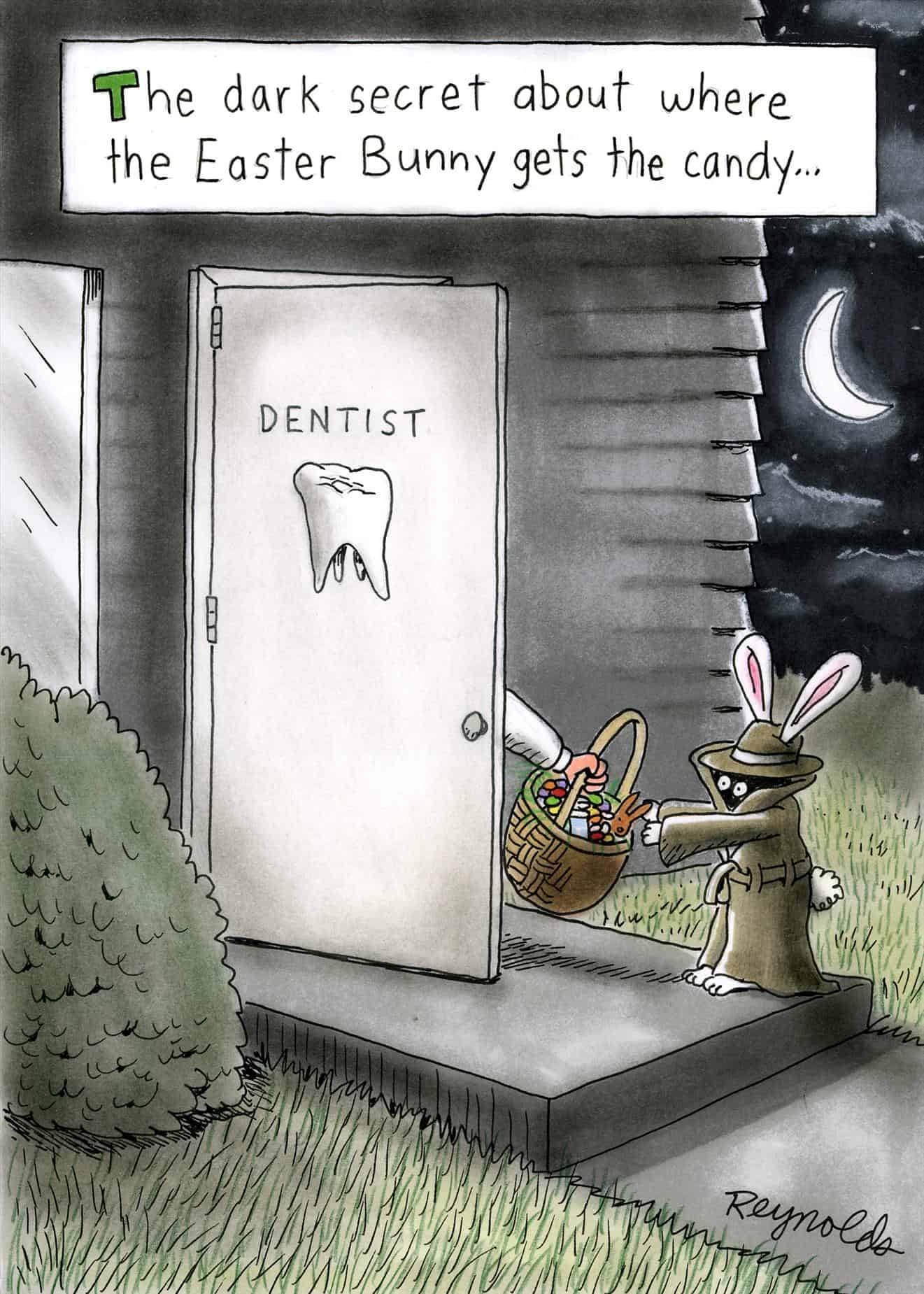Easter baskets, pretty clothes, family dinners, and religious observances are all hallmarks of Easter weekend. However, what many people look forward to at Easter are the sweet treats. Marshmallow Peeps, Cadbury Creme Eggs, and jellybeans are just a few of the sugary indulgences that are so tempting around the Easter holidays. When you add in Aunt Josie’s German chocolate cake and Grandma’s chocolate chip cookies, you realize that Easter is a time to relax a little bit in the diet department.
While many people know that too many sweets can sabotage their diets, they may often forget that too many sugary treats can damage their teeth too. When you eat sweet or starchy foods, the bacteria in your mouth will use the sugar to create energy. As those bacteria burn energy, they create very weak acids that can begin to erode the enamel of your teeth. The bacteria can form into a sticky layer on your teeth called plaque that must be removed by daily cleaning.
The enamel is the hard, outer layer of your teeth, and it is made mostly of calcium. Enamel protects the softer under-layers of the tooth, called dentine, from damage. A cavity occurs when the acids created by the bacteria in your mouth eat a small hole in the tooth enamel. This leaves the tender dentine vulnerable to those acids and the bacteria that are present in the mouth. Protecting the tooth enamel from oral acids will help protect your teeth from cavities.
The good news is this: With proper precautions, you can enjoy a few Easter indulgences without damaging your teeth. So go ahead! You can have your cake, your Reese’s Eggs, and your Dove chocolates and still have a beautiful smile for those Easter pictures by using these tips.
1. Practice Careful Sweet Selection
Limit your consumption of sweets that are sticky or gummy. While Marshmallow Peeps, caramels, and jelly beans are tasty, it’s better for you to indulge your sweet tooth with chocolate or other treats that will not stick to your teeth as easily. Additionally, you should avoid sweets that have a serious acid component. Lemonheads and other sour candies are usually pretty acidic, so it is better for your teeth if you bypass these treats. Avoid sweets that are very hard as well because they can break or chip your tooth enamel.
2. Don’t Graze
Munching on candies all day long is not only hard on your waistline, but it is also hard on your teeth. About 20 minutes after you eat, your saliva begins to neutralize the acids that are formed by the bacteria in your mouth. The more frequently that you eat, the longer your tooth enamel will be exposed to cavity-causing acids. Avoid the candy dish, and eat your sweet treats with a meal. If you can manage it, eat a crunchy food like an apple or carrot after you have something sweet. The texture of the crisp fruit will help scour some of the plaque from your teeth and freshen your breath. Wait several hours between eating to keep your teeth in optimal condition.
3. Rinse
While it may be tempting to brush after every indulgence, experts explain that brushing immediately after eating a starchy or sugary snack can do more damage than good. That is because your tooth enamel is softer while it is under attack from the acids in your mouth. Waiting a bit will help your enamel harden. Dentists recommend simply rinsing your mouth with water after eating a sweet treat. Plain water helps the saliva do the job of neutralizing the pH of the mouth.
4. Practice Good Oral Hygiene
As always, you should brush twice a day. Be sure that you are brushing your teeth gently, with a soft-bristled toothbrush. Brushing too hard can scour away tooth enamel or damage your gums. Just clean every exposed surface of your teeth with a gentle, swabbing motion. Tooth brushing should take about two or three minutes every morning and night, and you should follow your brushing with a thorough flossing at least once per day. There is really no reason to brush your teeth more often than twice a day, even if you are indulging in sweets.
Rinsing with a fluoride mouthwash at night can strengthen your tooth enamel. Additionally, many dentists highly recommend the use of a water flossing tool like a water pik to make sure that every part of your mouth is squeaky clean before retiring for the night. Always go to bed with clean teeth to avoid exposing your teeth to acids all night long.
5. Chew Sugarless Gum
Chewing sugarless gum after your Easter meal can help your saliva glands get to work neutralizing the acids in your mouth. It will also help remove food particles from your teeth. If you are not much of a gum chewer, all it takes is about 15 or 20 minutes to help minimize the effects of sugar on your teeth.
6. Drink Water Frequently
If you have a chronic dry mouth, you are at a higher risk for cavities. Your saliva can’t do its job properly if your mouth is dry. You can rinse your mouth throughout the day by drinking plenty of water if you have a medical condition that makes you have a dry mouth. However, if no medical condition is present, your mouth may be dry because you are not fully hydrated. Try sipping on a water bottle all day for several days, and you may find that your mouth is no longer dry. Don’t drink sugary sodas all day long. If you do consume these drinks, you should limit them to meal times and try to use a straw to minimize the contact of the soda with your teeth.
7. Visit the Dentist
After Easter is over and the candy wrappers are the only evidence of your yearly indulgences, you may want to make appointments for the whole family at the dentist for dental cleanings. The dentist will use his specialized tools to remove plaque from the teeth that can cause tooth decay. He will give you a dental deep cleaning to make sure that your teeth are sparkling clean and healthy. Additionally, he will thoroughly examine your teeth and those of your children for any tiny cavities that might be developing. Filling cavities while they are small will keep them from growing into big, painful problems.
Cavities are not an inevitable fact of life. You can prevent them by just taking a few precautions. By using these tips and making them a part of your dental hygiene habits, you can have lovely, disease-free teeth and enjoy the sweet treats of Easter and every other chocolate-filled holiday too.


